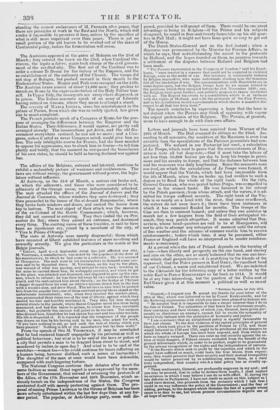The Austrians appeared at the gates of Bologna on the
21st of March ; they entered the town on the 23rd, when Cardinal OPPIEONI, the legate a latere, again took charge of the civil government of the revolted city. The first act of the Cardinal was to order a solemn Te Deum for the victory of the Emperor, and the re-establishment of the authority of the Church. The troops did not stop at Bologna, but pushed onward in their march to the Ecclesiastical States. Rimini and Forli were occupied on the 24th. The Austrian forces consist of about 24,000 men ; they profess to march on Rome by the express.invitation of the Holy Father himself. In Upper Italy, the insurgents are everywhere dispersed, or in prison. The Italian accounts speak of an army of Liberals having retired on Ancona, where they mean to attempt a stand. The severity of MARIA LOUISA, since her reinstatement in the palace of Parma, from which she was so rudely ejected, has given rise to much complaint. The French journals speak of a Congress at Rome, for the purpose of arranging the differences between the Emperor and the Italian States. Their ditferences, it would appear, are pretty well arranged already: The insurrections put down, and the old Government everywhere restored, he can ask no more ; and a Congress, unless it acted as never Congress acted, would give him no less. The only intelligible course for France, had she been minded to oppose his aggressions, was to check him in limine—to tell him plainly and boldly, that the moment he overpassed the boundaries of his own states, he should be held as having declared war against her.


























 Previous page
Previous page